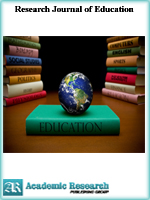Research Journal of Education
Online ISSN: 2413-0540
Print ISSN: 2413-8886
Print ISSN: 2413-8886
Quarterly Published (4 Issues Per Year)

Archives
Volume 3 Number 8 August 2017
Parent,s Contributions towards Education Process and Variations in School Performance Indices (SPI) in Uganda Certificate of Education (UCE) Examinations in Central and Northern Uganda
Authors: Odama Stephen ; Betty Akullu Ezati
Pages: 81-96
Abstract
The study examined the level of parents’ contributions to their children’s education process and its influence on SPI in UCE examinations in Central and Northern Uganda. The objective was to investigate the influence of the levels of the parents’ contributions towards education process of their children on the SPI in UCE in schools in Central and Northern Uganda. Quantitative and qualitative approaches were used. 72 school leaders, 80 teachers, 140 students, 12 parents and 10 Key Informants (KI) participated. Data was collected using interviews, questionnaires and Informal Conversational Interview and analysed to obtain SPA, SPI and RSPC, frequency counts, percentages and using t-test. The result showed that the Parents of students in schools in Central Uganda contributed more than the parents from Northern Uganda. This has resulted in schools in Central Uganda achieving higher School Performance Indices (69% ≤ 118%) than schools in Northern Uganda (71% ≤ 163%) School leaders, especially, of schools in Northern Uganda therefore need to encourage parents to contribute more in their children’s school.
Career Motivations of Turkish Prospective Teachers of English
Authors: Cemre Isler ; Ozgur Yildirim
Pages: 75-80
Abstract
This study aims at providing further insights into the factors influencing people’s decisions to pursue teaching English as a career. The study attempts to give answers to the following questions: (1) What are the career motivations of 1st and 4th grade prospective English teachers? (2) Is there a difference between 1st and 4th grade prospective English teachers’ career motivations? A total of 84 prospective English teachers (41 first grade and 43 fourth grade) participated in the study. The data were collected by means of a questionnaire designed to investigate career motivations of Turkish prospective English language teachers. For the data analysis, descriptive statistics in terms of mean and standard deviation were computed, and independent samples t-tests were conducted to find out whether the findings were statistically significantly different or not. The findings revealed that intrinsic and altruistic reasons were the most preferred ones by the student teachers. In contrast, extrinsic reasons were found to be the least influential factors behind the participants’ decisions to become a teacher. The findings also showed that there is not a statistically significant difference between the grades in terms of career motivations. According to the results, further implications were suggested in the study.



